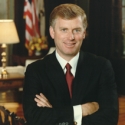 |
 |
|
|
|
Speeches |
|
|
Yokohama Symposium
April 15, 2004
| << Previous Page | Speeches | Next Page >> |
Hiroshi Nakada, Mayor of the City of Yokohama, (Names of other dignitaries), Ladies and Gentleman.
It is a great honor to be invited to speak on this major anniversary of the advent of the relationship between Japan and the United States. Fifteen days and one hundred and fifty years ago, in what was then the village of Kanagawa and has now become part of the City of Yokohama, our two great nations began a journey toward mutual understanding, cooperation, and alliance. It was the arrival of Commodore Mathew C. Perry or Perry-san. Most Americans have little knowledge of Perry-san but in Japan he is perhaps the most famous foreign historic figure. President Millard Fillmore had sent Perry on this mission largely because of America's need of oil - some things never change. However, back then it was oil from whales.
The story of Commodore Perry has great drama and men of courage and wisdom on both sides. The arrival of the black steamships must have aroused fear for the Japanese and also for the Americans - as hundreds of Japanese guard boats swarmed around their ships and thousands of Japanese rushed up and down the shoreline. Indeed Perry's very arrival was a critical event in Japan/US relations.
Perry's journal states that when the ships first arrived, a Japanese guard boat pulled alongside the flag-ship, Susquehanna. After great difficulty in communicating in the Japanese language - a dilemma I can identify with - one of the Japanese said, in very good English, "I can speak Dutch." This was the only English the Japanese man appeared to know, but it was enough to get the bilateral relationship started.
The day was July 2, 1853, when Commodore Matthew C. Perry sailed into Edo Bay and anchored less than 35 miles from Tokyo. He carried a letter from President Millard Fillmore to the Emperor of Japan, which stated in part:
"I have no other object in sending (Commodore Perry) to Japan but to propose to your imperial majesty that the United States and Japan should live in friendship and have commercial intercourse with each other."
The lessons we learned and the impact of the Perry mission are profound:
These events began - or at the very least hastened - a significant upheaval for Japan and its people: the dismantling of the policy of seclusion, which ultimately led to the end of the Tokugawa shogunate and the restoration of the Emperor in 1868. And out of this upheaval bloomed an economic and industrial powerhouse. In short order, Japan achieved unprecedented growth, modernization and industrialization with head-spinning speed, offering the world a demonstration of the strength, determination and industry of the Japanese people.
And, as often happens in world events, the true impact probably could not be envisioned by the people involved. The full impact of the opening of Japan took years to develop. Perry returned to the U.S. after this expedition and died in New York on March 4, 1858, not quite four years after the signing of the treaty. He did not live to see the vast impact of what he did. A full commercial treaty was not signed until 1858, and commerce was slow to develop. Perhaps in that day, there were people who might have quickly judged this historic mission a failure.
Today, we judge events on an immediate basis--whether it is a company's performance or a complex peacekeeping mission by "how are things going today." We must always remember to stand back - take a longer, more strategic view. History is the best judge.
My own journey to Japan began 16 years ago in 1978 when I was a new member of Congress. It was my first trip to Asia. I was one of a small delegation invited to Japan by the Japan Center for International Exchange which still provides an important function in politics and diplomacy. That journey to Japan opened a new chapter in my life. Since 1978 I have traveled extensively to Japan. When I was Vice President, I traveled to Japan five times in four years. Though we have always had issues between our countries, especially in trade like automobiles, beef, non-tariff barriers, my impression from the beginning has been the realization of the strong U.S./Japan alliance. I said in 1978 and will say today, Japan is the linchpin of stability in the Pacific.
[ Page 1 of 2 ]
| << Previous Page | Speeches | Next Page >> |